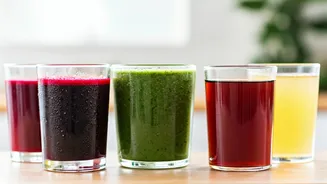Water's Vital Role
Water is fundamental to good health, acting as the foundation for the healthy heart. It facilitates optimal blood flow and prevents dehydration, which
can thicken blood and strain the heart. Staying sufficiently hydrated supports the effective transport of essential nutrients and oxygen to the heart muscle, and helps eliminate waste products. Regular water intake keeps blood vessels flexible, aiding their ability to dilate and constrict as needed. Moreover, water assists in maintaining a healthy blood volume and helps to regulate blood pressure. It is important to remember that drinking water is a daily habit which positively impacts all aspects of health. The benefits include promoting heart health and overall vitality, making it one of the most accessible and beneficial choices.
Green Tea's Power
Green tea is packed with antioxidants, most notably catechins, which are potent compounds that shield the body against cellular damage caused by free radicals. These antioxidants also exhibit anti-inflammatory effects, which can reduce the inflammation that often underlies the development of artery plaque. Studies show that regular consumption of green tea can improve cholesterol levels by lowering LDL (bad) cholesterol and increasing HDL (good) cholesterol. Additionally, green tea may contribute to improved blood vessel function, promoting better circulation and reducing the risk of blood clots. It is a flavorful and healthful beverage option that supports cardiovascular health in several ways.
Beetroot Juice Boost
Beetroot juice is a nutritional powerhouse, rich in nitrates that convert into nitric oxide in the body. Nitric oxide helps to relax and widen blood vessels, which lowers blood pressure and enhances blood flow. This improved circulation reduces the workload on the heart and decreases the risk of plaque formation. Moreover, beetroot juice contains antioxidants that can protect against oxidative stress, further supporting cardiovascular health. The consumption of beetroot juice, in moderate amounts, has been linked to significant improvements in cardiovascular function. Its benefits include improved heart health and reduced blood pressure, making it a valuable addition to a heart-healthy diet.
Tomato Juice's Impact
Tomato juice is an excellent source of lycopene, a powerful antioxidant that gives tomatoes their red color. Lycopene helps to protect the heart by reducing LDL cholesterol oxidation, a key process in plaque formation. It also plays a role in reducing inflammation within the arteries, which further supports the prevention of plaque buildup. Tomato juice can also boost blood vessel health and overall cardiovascular function. Incorporating tomato juice into your diet can be a delicious way to promote heart health, delivering a wide range of benefits that contribute to overall well-being. It is a nutritious choice for those looking to improve and maintain a healthy heart.
Pomegranate Juice's Effect
Pomegranate juice is exceptionally rich in antioxidants, including polyphenols, which combat oxidative stress and protect against arterial damage. These antioxidants help prevent the oxidation of LDL cholesterol and reduce the accumulation of plaque in arteries. Regular consumption of pomegranate juice has been linked to improved blood pressure and enhanced blood flow. Additionally, it can reduce inflammation, further safeguarding the cardiovascular system. Pomegranate juice contributes to a robust and healthy heart. It can be a very effective measure for those prioritizing cardiovascular health. Including this juice in your diet is both an enjoyable and beneficial step.


















